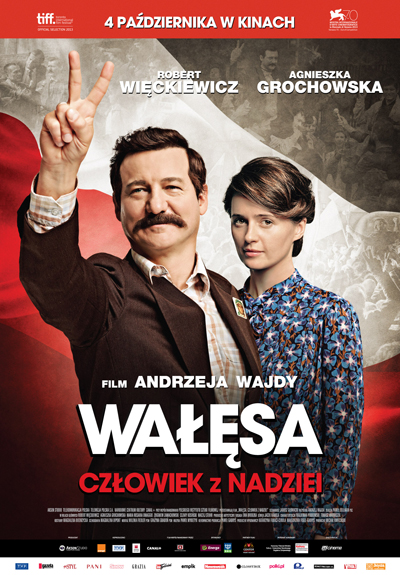

The new biopic of a famous Polish director is about Lech Wałęsa, ex-president of Poland who won the Nobel Peace Prize. Wajda reckons that that his biography was on of the toughest materials in his career. The film itself is a chronicle of Gdansk events. It includes documentary and fictional episodes.
The film was premiered at the Venice IFF.
Wajda was awarded the special prize for his achievements. Lech Wałęsa also visited Venice premiere.
The highly anticipated film, starring Robert Wieckiewicz and Agnieszka Grochowska, chronicles approximately 20 years in the life of Lech Walesa, the electrician turned politician who led Poland's Solidarity trade union movement through one of the most turbulent periods in the nation's political history. Key events portrayed include the union's founding in 1980, the brutal crackdown by authorities during the period of martial law from 1981-82, Walesa being awarded the Nobel Peace Prize in 1983 and Solidarity's ultimate election victory in 1989. Walesa was elected President of Poland in 1990, a post he held for five years.
However, Wajda does not glamorize Walesa or portray him simply as a one-dimensional figure pursuing his goals against seemingly insurmountable odds. Rather, he is shown as a fallible everyman with whom we can identify, trying to balance the demands of work with family responsibilities, and Janusz Glowacki's screenplay delves deeper, giving the viewer keen insight into Walesa's personal life and his relationships with his wife and children during those many tumultuous years.
Prior to the film's premiere on September 5, Wajda, who previously received the Golden Lion for lifetime achievement at the festival in 1998, will receive the Persol Prize, which celebrates “a legend of international cinema.” The ceremony will be held in the Sala Grande of the Palazzo del Cinema. Commenting on the award, Venice Film Festival Director Alberto Barbera said: “Wajda is not just the most emblematic director in post-war Polish filmmaking. He is the director who has been capable, in his work (over 50 films in his more than 60-year career), of raising the most decisive and important questions about the history of his country, and consequently, of Europe in its entirety, inviting us to reflect on the critical relationship between personal experiences and those of an entire nation, between the anguish that often befalls individual destinies and the weight of the collective task they are called upon to accomplish.”
Worldwide rights to the film were recently acquired by the Berlin-based company Films Boutique, and will be released in Poland on October 4.
A Robert Bodrog review
Wajda's “Walesa, Man of Hope” Fast-Tracked For U.K. and Ireland Release
The past couple of weeks have been good ones for legendary Polish director Andrzej Wajda. His latest film “Walesa, Man of Hope” which chronicles the rise of Lech Walesa, who became Poland's first president of the post-communism era, received a standing ovation following its world premiere at the Venice Film Festival on September 5, and screened earlier this week at the Toronto International Film Festival to wide acclaim.
Since then, the film has garnered lots of favorable reviews, generating considerable buzz. Initially scheduled for release in Poland on October 4, it was announced this week that “Walesa” will be released in London, Belfast and Dublin on October 18.
This is the first time that a Polish film has received a nearly simultaneous domestic and foreign release. This decision indicates the emergence of new markets for Polish films in cities with a significant Polish immigrant presence, and not just in American cities such as New York and Chicago. Significantly, the past decade has seen a large Polish emigration to the U.K. and especially Ireland, where Poles currently comprise the largest minority group in the country.
So purely in terms of target demographics, the choice to fast-track the film's release date in London, Belfast and Dublin makes good business sense. In fact, Wajda's biopic might make some film history of its own, as it stands a good chance to be the first Polish film to earn more in foreign box-office than domestically.
If that happens, this could represent a major paradigm shift in terms of how Polish features are distributed, given the existence of new lucrative markets which previously did not exist. And that would definitely be good news for the Polish film industry, which historically has been impeded by the fact that, however well made, there was a limited market for its films outside its borders.
However, with more Poles living outside of Poland in recent years, it was only a matter of time before marketing savvy caught up with reality and realized the potential revenue to be had by distributing Polish films to foreign markets where they're likely to do well.
For more information, visit the film's official website, available in English and Polish: http://www.walesafilm.pl/
































